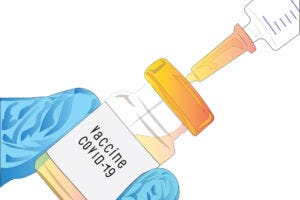October 7, 2022

Moderna is ‘eager’ to sell its mRNA vaccine in China but balks at the idea of transferring its technology or building a manufacturing facility in the country.
The conditions being imposed by China are: Moderna must sign up with a China-based partner, transferring all its technology to the China company and allowing the China company to make the drug, or the company must build a China manufacturing facility, again with a China partner, which would not involve a technology transfer.
Either way, Moderna assumes it would lose effective control of its intellectual property, which it refuses to do, citing worries that its reputation would suffer if a partner produced unsafe/lower quality vaccines.

Image: DepositPhotos/
[email protected]
After discussing the issues in 2020 and 2021, Moderna decided that no compromise acceptable to both parties was going to happen and backed away from the negotiations.
Moderna is clearly protective of its technology. It recently went to court against Pfizer and its German partner BioNTech, alleging that their partnered COVID vaccine violated Moderna’s mRNA patents of 2010 and 2016. That’s a story that will probably take years to resolve itself, given the enormously high stakes and usual duration of complicated patent disputes.
For its part, China seems adamant about keeping all ex-China COVID vaccines out of China. Fosun, which scored an early deal with BioNTech (before Pfizer signed on), has never been granted approval in China for its mRNA COVID vaccine.
On the face of it, BioNTech signed up with a China partner to produce and commercialize the vaccine in the mainland, which satisfies China’s stated requirements for approval of a foreign vaccine. It’s possible the Fosun deal did not contain an IP transfer – it wasn’t discussed in the official announcements – but Fosun did agree to build a production facility in China.
In fact, China has not approved any foreign COVID-19 vaccines and relies on several domestically developed shots. Because these products are not based on an mRNA technology, they don’t have the higher-than-expected 90% efficacy of the Moderna-Pfizer vaccines.
“We would certainly be very eager to collaborate with China if they felt that there was a need for a vaccine there,” said Moderna chief medical officer Paul Burton last month. “Currently, there is no activity going on, but we’d be very open to it.”
There is at least one more twist to this story. Last week, Moderna established a subsidiary in Taiwan which will make it easier for the company to collaborate with the nation’s private and public sectors, as well as academia. Separately, starting in September, Taiwan has received four shipments of Moderna’s next-generation COVID-19 vaccine targeting the BA.4 and BA.5 Omicron subvariants of SARS-CoV-2. Taiwan’s clinics began administering the doses on September 24.
A version of this article was first published on October 4, 2022 in ChinaBioToday
About the Author
You May Also Like






